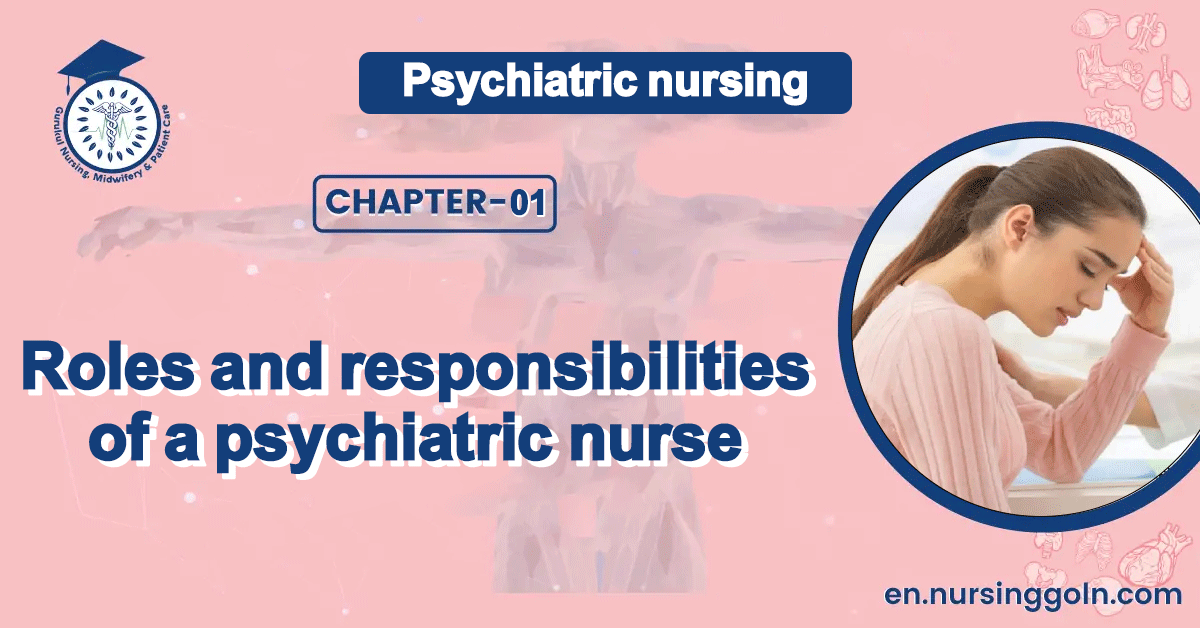Roles and responsibilities of a psychiatric nurse – This book covers the entire syllabus of “Psychiatric Nursing” prescribed by the Universities of Bangladesh- for Basic and diploma nursing students. We tried to accommodate the latest information and topics. This book is an examination-friendly setup according to the teachers’ lectures and examination questions.
At the end of the book previous university questions are given. We hope in touch with the book students’ knowledge will be upgraded and flourish. The unique way of presentation may make your reading of the book a pleasurable experience.

Roles and responsibilities of a psychiatric nurse
Role of a nurse in the care of the psychologically ill:
The following are some important tasks of a nurse in a psychiatric set-up.
1. The nurse often has the opportunity to intervene a behavior problem on the spot which if ignored or allowed to continue would aggravate the patient’s psychological condition.
2. The nurse should conduct brief counseling with patients and their families. Such counseling may be formally structured or may take place in informal situations keeping main focus on helping the patients in communicating more clearly.
3. The technical aspects of patient-care represent another major role of the nurse. She manages the distribution of drugs, carries out medical treatment and assists in physical methods of treatment.
4. Reporting is another main task. The nurse has to record, assess and report to the psychiatrist her observations regarding the patient’s behavior, the interaction between the patient and members of his family, the effects of drugs and other forms of treatment, the patient’s physical status, etc
5. The nurse plays the role of a surrogate mother when she takes care of the activities of daily living. She keeps him clean, helps him in the elimination, exercises his inactive limb, and makes sure that he gets sufficient nourishment by well-balanced diet. Exploiting this relationship to the fullest can result in considerable therapeutic benefit to the patient.
6. Health education is another important role. The nurse helps patients learn physical and mental hygiene,
7. The nurse motivates the patient to participate actively in rehabilitation programs like occupational therapy, industrial therapy and recreation therapy.
8. The nurse in a psychiatric set-up also guides and supervises the functions of other paramedical personnel in the ward. These staff members work closely with the patients and depend on the nurse for directions and guidance,
9. The nurse as a helping and caring person makes the patient feel supported and reassured. Thus, the nurse acts as a psychotherapist.
10. Nurses also conduct family therapy and group therapy in a co-therapist situation or alone or as part of a team. Nursing’s role in crisis intervention and suicide prevention is very vital.
11. A psychiatric nurse has to play different roles according to the setting.
12. Her job may be looking after demented elderly inpatients at one setup and working in a therapeutic community run for adolescents in another. Other varied situations include the acute admission ward of a large psychiatric hospital, community work, where patients are seen in their own homes, attachment to a psychiatric department in a general hospital, administrative work and work in a day hospital or out-patient clinic.
[Ref: S Nambl/212-31]
Responsibilities of a Psychiatric Nurse
As a mental health nurse, you’ll need to:
- Assess and talk to patients about their problems and discuss the best way to plan and deliver their care
- Build relationships with patients to encourage trust, while listening to and interpreting their needs and concerns
- Ensure the correct administration of medication, including injections, and monitor the results of treatment
- Respond to distressed patients in a non-threatening manner and attempt to understand the source of their discomfort
- Help patients manage their emotions through de-escalation techniques
- Prepare and participate in group and/or one-to-one therapy sessions, both individually and with other health professionals
- Provide evidence-based individual therapy, such as cognitive behaviour therapy for depression and anxiety
- Organise social events aimed at developing patients’ social skills and help to reduce their feelings of isolation
- Prepare and maintain patient records and produce care plans and risk assessments
- Make sure that the legal requirements appropriate to a particular setting or group of patients are observed work with patients’ families and carers, to help to educate them and the patient about their mental health problems.
- Gauging patients’ psychiatric states.
- Collaborating on psychiatric intervention
- Administering psychotropic and similar medications.
- Monitoring adherence to non-medicinal treatment regimens.
- Removing potentially harmful and triggering environmental features.
- Restraining, consoling, and sometimes medicating highly unsettled patients.
- Recording patients’ health journeys and reporting on notable alterations.
- Conducting targeted psychoeducation, particularly within families.
The Mental Health – Mental Health Illness Continuum
Mental Health
Concept of mental health
Mental Health is a sound, efficient mind and controlled emotions. Body and mind are working together (Psycho-somatic unit) efficiently and harmonious manner, whose behaviour is determined in integrated way by both physical and emotional factors. If a person is well-adjusted, he has good physical health and desirable social and moral values.
It is the total and harmonious functioning of the whole personality of an individual for optimum functioning with maximum realization. A process of continuous adjustment, aims at progressive goals. An ability to cope with the present and to adjust satisfactorily in the future.
(Ref: KP Neeraja/I/Vol-1/31)
Health and mental health
Definition (According to WHO):
“Health is a state of complete physical, mental, and social well-being and not merely an absence of disease or infirmity, so that each citizen can lead a socially and economically productive life.”
(Ref: K. Park/25)
Another definition of health experts
Health is a state of complete physical, mental and social well-being of an individual. Health is often affected by diseases. Health of an individual deteriorates with variations in physiological and biological aspects of the body. Health depends upon the diet, age, mental peace, type of work etc.
Or,
As defined by World Health Organization (WHO), it is a “State of complete physical, mental, and social wellbeing, and not merely the absence of disease or infirmity.” Health is a dynamic condition resulting from a body’s constant adjustment and adaptation in response to stresses and changes in the environment for maintaining an inner equilibrium called homeostasis.
Mental health:
More recently, mental health has been defined as “a state of balance between the individual and the surrounding world, a state of harmony between oneself and others, a coexistence between the realities of the self and that of other people and that of the environment”.
[Ref: K. Park/25/]
Or,
Mental Health is a state of the individual’s mind, where he can adjust and adopt to the situations in a harmonious manner, body and mind work together in same direction in order to lead a happy and productive life. It is a state of well-being.
(Ref: KP Neeruja/”)
Or,
World Health Organization defines mental health as “the capacity of an individual to form harmonious relationships with others and to participate in, or contribute constructively to th changes in the social environment.
[Ref: S Nambi/2/231]
Or,
Menninger defines Mental Health as “The adjustment of human beings to the world and to each other with a maximum of effectiveness and happiness”.
Ref : S Nambl/2/231
Or,
Mental health can be defined as the successful performance of mental fünctions, resulting in productive activities, fulfilling relationships with other people and the ability to adapt to change and cope with adversity from early childhood untillate life, mental health is the springboard of thinking and communications skills, learning, emotional growth, resilience and self-esteem.
Ref-Maya George/2/11
Dimensions of mental health
Dimensions of mental health:
1. A positive attitude towards one’s self, acceptance of weakness and pride in strengths, motivation towards inner stability.
2. Growth and development towards self-realization of one’s potentials towards achieving the best of what one might become.
3. Integration of personality involving a balance of psychic forces, unified outlook as life and some capacity for withstanding anxiety and stress.
4. Autonomy of action in which the individual determines behaviour.
5. A perception of reality, free from wishes, desires, concerned with the welfare of others.
6. Mastery of environment by
♦ The ability to love
♦ Adequate in work, play and leisure
♦ Competence in human relations
♦ Capacity to adapt oneself to current situations
♦ Draw satisfaction from one’s own environment
♦ Willingness to use problem-solving approaches in the life processes.
[Ref: KP Neeraja/I/Vol-1/3]

Criteria of positive mental health
Criteria (signs) of mentally healthy persons:
1. Self-satisfied:
➤ He feels comfortable about himself.
➤ He feels reasonably secure
2. Self-respected:
➤ He knows his ability
➤ He is ready to accept his short comings.
3. Self-confident:
➤ He should not overestimate or underestimate himself.
➤ He should grow interest to himself and his surroundings.
➤ He should able to take decision and can stay on it.
4. Self-controlled:
➤ He holds his own emotions (fear, anger, joy, guilt, love etc.)
➤ He should be able to tolerate criticism by others
5. Self-conscious:
➤ He is conscious about the environment and can adjust with it.
➤ He feels himself as a part of the society and takes interest of others as well as takes hardship and responsibilities for them.
6. Self-adjusted:
➤ He is friendly with everybody.
➤ He trusts others.
➤ He can meet the present demands of life, faces the problems with courage.
➤ He finds pleasure in working and can shoulder all responsibilities without complaints or disregard.
➤ He can forget past mistake and can learn from past experience.
➤ He is not nervous of unknown future.
In short:
Criteria of a mentally healthy person:
1. Is free from internal conflicts.
2. Is well adjusted.
3. Searches for identity.
4. Has a strong sense of self-esteem.
5. Knows himself, his needs, problems & goals.
6. Has good self-control.
7. Faces problems and tries to solve them intelligently,
[Ref: RKH/S/]
Mental hygiene and mental age
Mental hygiene:
‘Mental Hygiene includes application of scientific principles and practices for promotion, preservation and maintenance of Mental Health and prevention of Mental Disorders, enjoys healthy practices to lead productive, happy and contended life’
(Ref: KP Neeraja/I/Vol-1/8/)
Or,
‘It is concerned with the principle and practice in promotion, maintenance of the mental health and the prevention of mental disorders’
[Ref: JA Hatfield]
Or,
“The realization and maintenance of the mind’s health and efficiency’.
(Ref: DB Klein, 19561)
Mental age
Mental age is a concept related to intelligence. It looks at how a specific child, at a specific age usually today, now-performs intellectually, compared to average intellectual performance for that physical age and measured in years. The physical age of the child is compared to the intellectual performance of the child, based on performance in tests and live assessments by a psychologist. Scores achieved by the child in question are compared to scores in the middle of a bell curve for children of the same ages.
[ K. Park/25 ]
